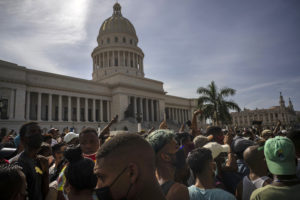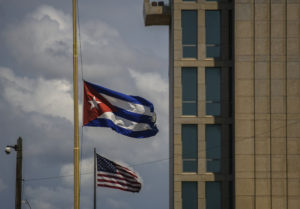By Geoff Thale and Ana Sorrentino
For years, Cuba policy has been the third rail of South Florida politics. Politicians, both Democratic and Republican, have been ardent supporters of the embargo, and the conventional wisdom held that supporting change in U.S. policy toward Cuba—seen by the Cuban-American community as making “concessions” to the Cuban government—would make a candidate unelectable. (For example, in the 2000 presidential election, Vice President and Democratic candidate Al Gore won a mere 17 percent of the Cuban-American vote shortly after the Clinton administration returned Elian Gonzalez to Cuba.)
But in 2012, both national and local elections challenged that conventional wisdom. In his first term, President Obama ended restrictions on Cuban-American family travel and later eased restrictions on educational and purposeful travel. In spite of these “concessions,” in the 2012 election, he went on to win South Florida, and exit polls indicate that he either won or came close to winning the Cuban-American vote. That same year, Democratic congressional candidate Joe Garcia, running in a district that includes portions of Miami, won on a platform that supported the President’s decisions on travel to Cuba.
This week, we’ve seen even more decisive evidence that the power has been turned off on the third rail. #CubaNow, a Miami-based pro-engagement group, ran an issue ad this week attacking Florida politicians that want to turn back the clock and end family travel. At a campaign debate on October 6, Congressman Garcia and his challenger, Republican Carlos Curbelo, were asked about their stances on travel to Cuba. Garcia defended President Obama’s reforms, emphasizing that Cuban Americans in South Florida were visiting family in Cuba and sending remittances. Curbelo, on the other hand, opposed “unilateral concessions” to the Cuban government. By October 8, Curbelo, in an interview with the Miami Herald, was backpedaling and explaining that he would not seek to change the current regulations that permit family travel and unlimited family remittances.
While national polls have long shown that a majority of Americans favor an end to any restriction on travel to Cuba, recent polls by Florida International University and the Atlantic Council have shown that majorities in the Cuban-American community and in Florida also support policy change. Like Curbelo, politicians have begun to shift their positions accordingly. Former Secretary of State Hillary Clinton, who is widely expected to run for president in 2016, recently made public her opposition to the embargo. And in February 2014, Democratic candidate for Florida governor Charlie Crist announced his opposition to the embargo, which he had previously supported. While the announcement caused waves both nationally and locally, the shift had little effect electorally: a poll conducted several months later found that only 24 percent of registered voters in Miami-Dade County were less likely to vote for Crist as a result of his new position on the embargo. A supermajority of voters—67 percent—said that Crist’s position on Cuba made no difference to their choice of candidate.
The response to the #CubaNow issue ad—and the quick shift in Curbelo’s position—make it clear that even in Florida, supporting Cuba policy change is no longer a political death sentence. In fact, it may be politically advantageous for candidates in close races to support the right to travel to Cuba, which is good news for Cubans on the island, their family in the United States, and advocates for engagement with Cuba.
Geoff Thale is WOLA’s Program Director. Ana Sorrentino is WOLA’s Program Officer for Cuba.


